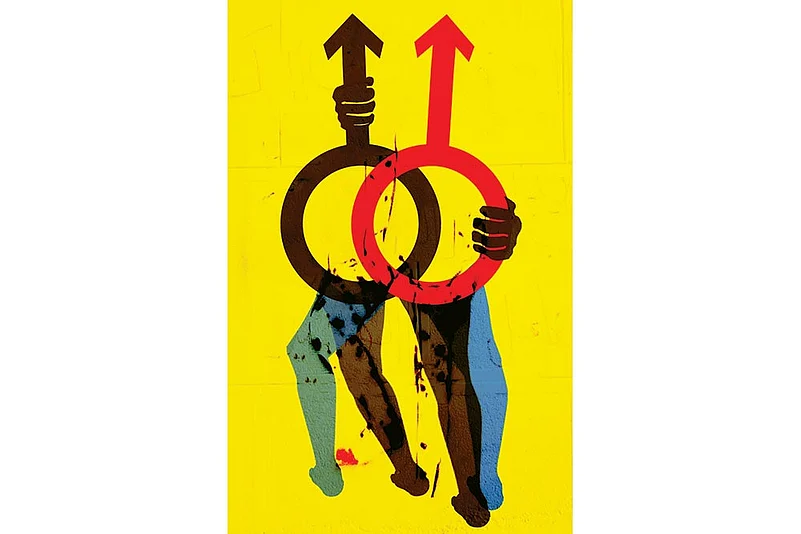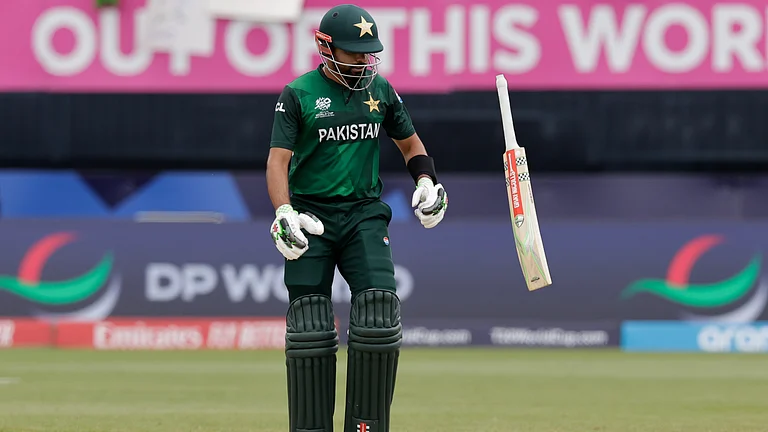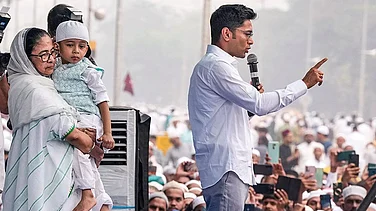Adult men rarely complain of being gang-raped. When a BHU student, in his first year of MA, complained of being abducted and raped by some men, he invited disbelief and scorn. The police refused to entertain his complaint; the university warned him against making the matter public, and the medical examination, conducted 10 days after the incident, concluded there was no evidence of him having been raped.
A village postmaster’s son, he has been studying in the BHU campus for the past four years. Still traumatised a fortnight after the incident, the victim told Outlook that nothing really had prepared him for the ordeal. He was walking towards the hostel mess for dinner around 9.30 pm on August 13, he recalled, when he was abducted by five men in a car.
With handkerchiefs tied around their faces, they first gagged him, then his back was burnt with cigarette butts and he was forced to swallow a large volume of alcohol till he felt giddy and passed out. When he regained consciousness he found himself in excruciating pain, lying in an area inside campus where construction was going on. He also claims to have recognised one of the men (a junior lab assistant at one of the institutes on the campus) because the kerchief he had used to mask himself with had slipped.
The next morning, he complained to the police, but was verbally abused as a “habitual offender” and threatened with dire consequences, and was intimidated into submitting an application for a compromise. A member of the proctoral board, he claims, also discouraged him from going to the police because it could tarnish the university’s image. He claims to have bled during the next few days but no help came his way, nobody advised him to approach the hospital and no medical examination was conducted either.
An FIR was finally registered on August 17, when some of his friends came to know of his ordeal. He claims his medical examination was conducted on August 18 and an advanced examination on August 23, and he was told that there was no evidence of rape. Now, the vice-chancellor, who was out of station, has set up a three-member committee headed by the dean of the Institute of Medical Sciences on August 26. The panel is to submit its report within seven days. The lab assistant, who the boy had identified, has been suspended. Faculty members, he confided, have extended their moral support in private but few of them are ready to stand by him so openly.
While the judiciary continues to grapple with section 377 of the Indian Penal Code, Indian law still does not distinguish between consensual homosexual relations and adult men subjected to anal sex against their wishes.
Psychologist Aruna Broota points out the example of Konark temple, where sculptures vividly depict homosexuality, lesbianism etc and says, “Sexual dysfunctions have been prevalent since the beginning of the human race. It’s an ancient phenomenon. It is just that now we have started talking about it openly.”
“I think people need to be educated about how it is not just the girl child who needs to be protected but boys too, who are vulnerable to being sexually abused by domestic helps, even fathers, brothers, uncles, cousins etc,” she adds.
Sodomisers do generally suffer from psychiatric disorder; otherwise, how can one have sex, an act of pleasure, by force, wonders Broota. Sodomisers are maniacs, but not all maniacs are sodomisers, she stresses. And as the accompanying chart shows, the cases registered in the national capital under Section 377 of the IPC have gone up sharply. Most cases, however, remain unreported.
Psychologists and counsellors admit receiving an ever-growing number of traumatised men, both old and young. They reel off one case study after other to prove that people are finally coming out and sharing their darkest traumas.
One of them recalls a senior officer in the Indian Army who was sexually abused when he was 10 by an orderly. When he informed his father, the orderly was removed. Though the abuse happened once, it was enough for him to develop a grudge against his father. “He felt that his father did not protect him from the orderly. As a result, he has not been able to communicate with his father,” recalls a counsellor. He grudgingly wondered why his father did not kill the orderly when he could kill so many others, like his own uncle, over a property dispute.
Hostels, prisons and the armed forces are known to be facing an increasing number of sodomy cases, though authentic figures aren’t available. Of course, incidence within families is shrouded in secrecy. The occasional arrest of a teacher, a policeman and so on serves merely as reminders of what many believe is an ugly rite of passage for Indian men.
The aforementioned army officer is undergoing treatment for trauma and depression. He doesn’t look people straight into the eyes, starts crying and loses self-confidence. He is prone to get physically violent, sometimes hitting out at his father, and is not getting promoted due to lack of interpersonal skills. Today, he sees every male as a sodomiser, like the orderly who had abused him. Counsellors cite the example of a 12-year-old boy who was sodomised by his own paternal uncle. The child had a nervous breakdown. “I am afraid of people. I don’t like to talk to teachers or friends; I don’t like to be appreciated by my teachers. I don’t like people smiling at me; I don’t like good comments.” He fears that any form of appreciation is just a ruse to lure him for sexual abuse.
To make matters worse, the child’s ordeal received little empathy or support in the family. The mother accused her son of keeping wrong company and trashed his allegations against the uncle. The counsellor’s opinion, too, was disregarded.
In a twist to the tale, the father, the son of an IAS officer, himself broke down. His son’s tormented face transported him back to his own childhood, when he too was sexually abused by the house’s chowkidar. The father trusted his son and offered to cooperate with the counsellor. When the boy’s elder brother, who is now 18, was called in by the counsellor, he too admitted sexual abuse by the uncle. But such cooperation from within the family is rare.
Harish Iyer, child sexual abuse survivor and equal rights activist, feels sexual abuse of the male child is not discussed openly because there is a lot of pressure imposed by society on men and boys to be ‘protectors’. Thus, it’s looked down upon if they instead appeal for protection from grievous injury. “The victims of patriarchy are men themselves,” he says.
“Men do undergo rape by other men, and young boys are sexually abused by women too. The fact is, just because it doesn’t come out in the open doesn’t mean that it doesn’t happen. There is a danger in stereotyping. There is a danger in assigning a sexuality to a rapist. A classic case is when a woman was raped in a moving bus, no one referred to that gory rape as a ‘heterosexual rape’ or said that it was a rape by heterosexuals,” fumes Iyer.
Deepak, a psychologist, who till recently was teaching in Oxford, says one has to do everything possible to crush and obliterate the narrative which says, ‘I will never recover from this trauma and I will never feel fine again’. “People assume male children are at lesser risk, but that’s not true. Statistically, both male as well as female children get molested,” he says.
***
Silent Sufferers
Hostels, prisons and the armed forces report an increasing number of sodomy cases
- Raghavji, finance minister of Madhya Pradesh in 2013, was forced to resign after being accused of sodomising domestic staff
- Theatre Age director in Chandigarh charged with sodomy
- An assistant sub-inspector arrested in Odisha’s Kendrapara district for sodomising a 25-year-old home guard
- Punjab police arrested the chief of the state’s Gau Raksha Dal under several charges, including sodomy
Spiralling Cases

* Up to 15 August 2016
**Source : Delhi Police. Figures denote registered cases under Section 377 of the IPC for ‘unnatural sex’
** A Centre for Civil Society survey reported 18 per cent of the men surveyed admitting to have been coerced to have sex; 16 per cent claimed a female perpetrator and 2 per cent a male perpetrator
By Bula Devi in Delhi






















